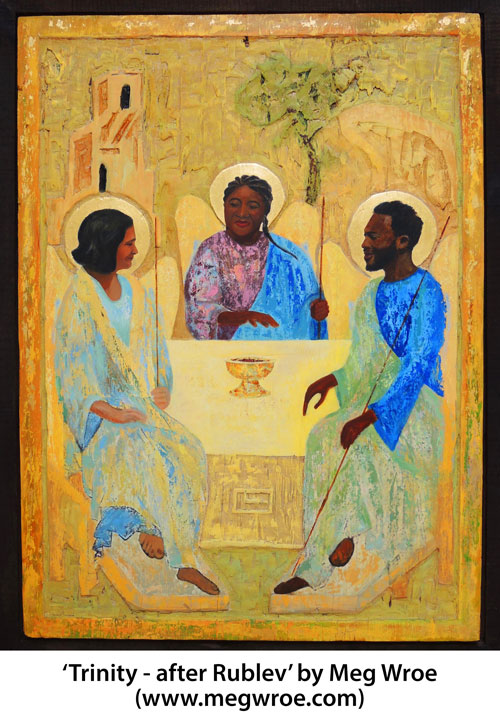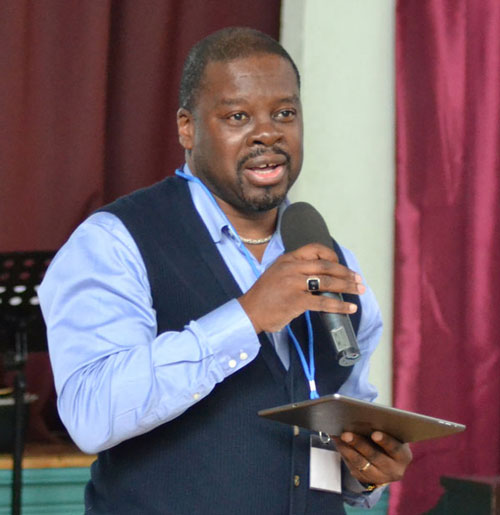The Apology - Ten Years On
 In November 2007, Baptist Union Council passed an historic resolution apologising for our part in the transatlantic slave trade. Our Justice Enabler, Wale Hudson-Roberts, shares his thoughts as he reflects on all that has happened in the intervening ten years.
In November 2007, Baptist Union Council passed an historic resolution apologising for our part in the transatlantic slave trade. Our Justice Enabler, Wale Hudson-Roberts, shares his thoughts as he reflects on all that has happened in the intervening ten years.
In his book, Ministry for a Multicultural Church, Robert Schreiter defines a multicultural church simply as ‘many cultures together in one church’. This is an incorrect definition and understanding of the term ‘multicultural’.
A multicultural community must be more than a reflection of ethnic and cultural diversity. Rather it is one that prioritises how it addresses privilege and hierarchy, and also embraces cultural tension; these are the main ingredients to creating a multicultural community. A truly multicultural community is where the existence of the ‘other’ is respected as a matter of fact, where the relationships refuse to be infected by racism, the ‘powerful’ and ‘powerless’ cultures are encouraged to find their true identity with each other in Christ. The term multicultural recognises the inherent worth of human diversity and challenges the inequalities of worth which are so often attached to human-constructed hierarchies. Therefore, a multicultural Union is one that reflects justice in strategy, policy, procedure, liturgy, theology, worship and, above all, creating culturally sensitive, listening, learning and transformative relationships - the types of relationships that the Apology should have achieved.
The Long Road to the Apology:
During his sermon at the 2007 Joint Baptist Assembly, the Revd Karl Henlin (President of the Jamaica Baptist Union), whilst drawing his sermon to a close, urged British Baptists to offer a “full apology for what really has been a most monstrous action”. He said: “The apology is necessary in order that the forgiveness that is on offer can be appropriated, the healing made complete and the chapter closed. This has been raised before by us with your leaders; perhaps the time has come to reconsider this matter again.”
In the aftermath of the sermon, it was difficult to know what the Assembly was thinking. What is indisputable, however, is that Revd Henlin’s challenge changed the course of race relationships in our Union. His message emboldened Black Baptists to grasp the nettle and seek an apology, also helping some White people to better understand the call for an apology. It was not long after Henlin’s challenge that our Union’s Trustees agreed for the Racial Justice Group ‘to develop a process for a conversation concerning an apology at BUGB November 2007 Council.’
The Apology:
On Monday 12 November 2007, Jonathan Edwards, at that time our Union’s General Secretary, opened up the Apology conversation. He encouraged Council to listen carefully to one another and to do so with deep respect. We were reminded that we live in a society that is still deeply racist. After a number of presentations, plenary and small group sessions, a small group was tasked to formulate an appropriate resolution which was presented to Council.
The words read as follows:
‘As a Council we have listened to one another, we have heard the pain of hurting sisters and brothers and we have heard God speaking to us.
In a spirit of weakness, humility and vulnerability, we acknowledge that we are only at the start of a journey but we are agreed that this must not prevent us speaking and acting at a Kairos moment.
Therefore, we acknowledge our share in and benefit from our nation’s participation in the transatlantic slave trade.
We acknowledge that we speak and as those who have shared in and suffered from the legacy of slavery and its appalling consequences for God’s world.
We offer our apology to God and to our brothers and sisters for all that has created and still perpetuates the hurt which originated from the horror of slavery.
We repent of the hurt we have caused, the divisions we have created, our reluctance to face up to the sin of the past, our unwillingness to listen to the pain of our black sisters and brothers, and our silence in the face of racism and injustice today.
We commit ourselves, in a true spirit of repentance, to take what we have heard learned from God in the Council and to share it widely in our Baptist community and beyond, looking for Gospel ways by which we can turn the words and feelings we have expressed today into concrete actions and contribute to the prophetic work of God’s coming kingdom.’
After some prayer it was then proposed;
‘In the light of our discussions concerning the transatlantic slave trade and the statement that arises from the discussions, Council asks the Mission Executive, Trustee Board and other appropriate bodies to continue to develop ways of promoting racial justice within BUGB and wherever possible in the world beyond.’
Most Council members would agree that the unexpected happened. Few Council members anticipated an apology. I have often reflected on this significant occasion when hearts and minds merged, melted and bowed before the voice of God. The following year a small delegation took the Apology to the Jamaica Baptist Union. Though the Jamaica Baptist Union accepted the Apology, they had reservations about how its words would be converted into action. Their main concern was to see how the resolution would transform the life of our Union enabling it to become a genuinely multicultural Baptist family.
The Journey:
The vision to build a multicultural Union fused with justice was the conviction that led the Racial Justice Working Group to begin what became known as The Journey. By the end of 2008, with the support of Council, preparations were made for the RJWG to embark on a methodology involving two complementary approaches.
One involved quantitative research and consisted of a questionnaire sent to all our Union’s churches asking a range of questions designed to establish factual information regarding ethnic diversity within congregations and their participation in worship and leadership in particular. The other method involved qualitative research that was to provide vital insight and strategic direction for ‘The Journey’. Five recommendations emerged from this careful research:
-
Building multicultural congregations
-
Developing the leadership skills of black and minority ethnic youth
-
Training of ministers and church members for culturally inclusive ministry and mission
-
Multicultural events that strengthen the participation of BME individuals in Union life and celebrate the cultural diversity within our Union
-
Establishing culturally inclusive structures (including Baptist House).Along with the Racial Justice Group, these have been the areas in which I have been working, with colleagues around our Union, during the past ten years.
Progress:
I have been asked many times if the Apology has positively impacted our race relationships. Sadly, progress has been slower than I had hoped. I am in no doubt that what happened with Council was an act of God. I am in no doubt that many of us have worked exceedingly hard to convert the words of the Apology into something meaningful and transformative to create a Baptist community which reflects the diversity of God. Yet for all this, change has been painstakingly slow, reinforcing how complex and titanic a job it is develop and sustain genuine multicultural relationships in a community soaked in the privilege of whiteness.
To create a just and equitable Baptist family requires recognition of one’s privilege and a willingness to sacrificially share that privilege with the 'other’.
I have to remind those who like to claim that we are light years ahead because of the Apology that having a sprinkling of BMEs in Baptist Union Council or a local church does not automatically constitute a multicultural gathering. When the ‘outsiders’ feel treated like ‘insiders’ and the ‘insiders’ listen attentively to the ‘outsiders’; ‘insiders’ empathise with the frequent discriminatory practices experienced by the ‘outsider’; all are proactive in changing the culture so that it is owned by both the ‘insider’ and ‘outsider’ - only then can our churches boast of participating in the long and arduous journey towards shalom - building and participating in a multicultural body.
What happened in 2007 was an act of God. Ten years on, many BMEs say that they belong to Baptists Together, but still do not feel and believe deep inside that they are part of the Baptist family.
A vision for the future:
Where would I like to see Baptists Together ten years from now? It would be unrealistic for me to suggest that our Union will be entirely free from racism and other forms of discrimination; that's a vision that will only be realised in heaven. However, I do think it is realistic to pray that in the next ten years we Baptists will experience a touch of heaven in our churches. Among the many areas that the text, 'on earth as it is in heaven' relates, it must surely be the practice of the prophetic.
Martin Luther King refused to relegate following Christ to the private spiritual realm or personal piety. The wonderful experience of rebirth must, according to King, translate into 'on earth as it is in heaven’. Luther King described this as ‘a community bathed in justice principles and behaviour; a prophetic church seeking to denounce and dethrone all discriminatory practices; a glimpse of heaven on earth.’
It goes without saying that this is a long-term vision. It is one that some Baptists are strenuously working towards, and I believe it to be an achievable vision. The prerequisite for equality and justice to become a reality in the future is intentionality and some sacrifice - on both the national and local church fronts.
So ten years from now I would like to see the Baptist family which makes up Baptists Together unconditionally embracing and affirming all nationalities, ethnicities, cultures and traditions. This is a foretaste of heaven...
 Wale Hudson-Roberts is the Baptist Union's Justice Enabler. He and the Racial Justice Group have been instrumental in developing some new resources to help churches reflect on the Apology and the on-going relationship of British and Jamaican Baptists.
Wale Hudson-Roberts is the Baptist Union's Justice Enabler. He and the Racial Justice Group have been instrumental in developing some new resources to help churches reflect on the Apology and the on-going relationship of British and Jamaican Baptists.
Click here for more information about:
-
Lest we Forget - studies to equip Baptists to reflect on the 2007 Baptist Union Apology and explore ways to address the legacy of the transatlantic slave trade.
-
Journeying to Justice - a comprehensive appraisal of the tumultuous journey towards equity and reconciliation amongst British and Jamaican Baptists
Baptist Times, 22/10/2017